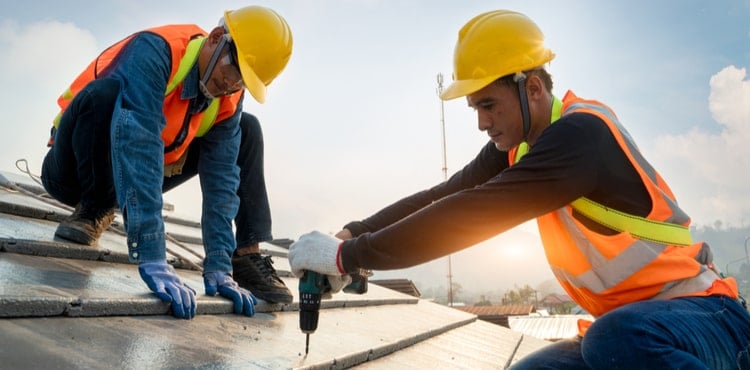What types of construction insurance do you need?

One mishap or blocker could devastate your company financially if you don’t have the right business insurance coverage in place. That’s why every construction company owner or contractor should know the different types of insurance policies available to protect your business and construction projects.
We’ll give you an overview of which policies you’ll need for your construction and contractor small business, and how much you can expect to pay.
What are construction project risks?
The construction industry comes with enormous risks. These include:
- Construction or design defects: Due to misunderstandings, poor performance, inadequate or ambiguous documentation, or unrealistic expectations.
- Delays: Caused by defective tools, or environmental and weather risks.
- Equipment damage and theft: Includes vandalism, and stolen or damaged tools and gear.
- Worker and third-party injuries: Includes on-the-job injuries and accidents.
All of these risks could result in huge financial and property losses. That is why it's important to get construction project insurance.
What is construction insurance?
Construction insurance protects construction companies, general contractors, and property owners from lawsuits, property loss, and other costly liabilities.
For many construction and contractor companies, a single insurance policy will not be enough. Instead, you’ll need a unique set of different insurance policies that each provide a specific type of protection for your business and construction projects.
Even when insurance is not required, it's still important to carry coverage as it can help protect your business from common risks on the job, as well as help you gain client trust and win new contracts.

What are the types of construction insurance?
As a construction business owner or project manager, you should consider the following types of coverage for your company:
General liability insurance
General liability insurance protects against common risks that construction businesses face. These risks include:
- Third-party property damage
- Third-party bodily injury
- Copyright infringement and other advertising injuries
- Damages caused by your completed construction or installation
If one of these events were to occur at your work site, your commercial general liability policy would cover the cost of any medical bills, and any property repair or replacement costs.
Because the risk of bodily injury and physical damage to property is much higher in construction than in other industries, general liability should be an essential part of your construction insurance coverage. Your clients may even require you to carry this coverage in order to complete construction projects.
When choosing a general liability insurance policy, make sure it includes products-completed operations coverage, also known as product liability insurance. This coverage provides financial protection against lawsuits over property damage or bodily injury caused by your construction project, such as a construction defect that later causes an injury.
You should also consider adding contractors pollution liability insurance as an endorsement to your general liability policy. A type of environmental insurance, contractors pollution liability coverage protects against pollution-related events that may cause third-party bodily injury or property damage.
Workers' compensation insurance
Workers’ compensation insurance covers medical expenses and lost wages for your employees when they suffer a job-related injury or illness. Most states require any construction company or contractor that has at least one employee to carry workers’ comp insurance.
Construction is a physically demanding industry with a lot of opportunities for injuries. If you or one of your employees were to get hurt on the job and you didn’t have workers’ comp coverage, you could be held responsible for the resulting medical bills and lost wages.
Workers’ compensation insurance protects you, your business, and your employees by covering those expenses. Additionally, employer's liability insurance is included in most workers' compensation policies and can help pay for employee lawsuits should a worker point to unsafe working conditions as a reason for their bodily injury.
Commercial auto insurance
An auto accident can get extremely expensive, especially if another person is injured. A commercial auto insurance policy will cover medical bills, legal expenses, and property damage if one of your company vehicles are involved in an accident. This includes trucks and other vehicles that are commonly used during construction projects.
Most states require construction businesses and contractors to carry commercial auto insurance for business-owned vehicles, but the required amount of coverage varies. It’s best to have enough coverage to meet both your state’s requirements and the amount you might expect to pay in an accident.
Builder's risk insurance
Builder’s risk insurance (also known as course of construction insurance) covers the costs of damage done to a building or structure while it’s still under construction. This damage could be caused by:
- Fire
- Weather
- Vandalism
While other construction insurance policies protect equipment and people, most won’t cover an unfinished structure. Builder’s risk policies fill that gap and ensure that your business isn’t stuck paying for damaged or ruined building materials before it’s even finished.
A builder’s risk insurance policy provides peace of mind to both you and your clients, making it a great addition to your construction and contractor insurance bundle.

Contractor’s tools and equipment insurance
If your tools are lost, stolen, or damaged, it could cost your company thousands of dollars to repair or replace them. Fortunately, contractor’s tools and equipment insurance covers the cost of repair or replacement for qualifying equipment.
This policy typically covers a wide variety of tools and equipment that are less than five years old, such as hand tools (saws, wrenches, and hammers) and power tools (drills, nail guns, and circular saws). If you need to file a claim for lost, stolen, or damaged tools, your insurance provider will cover the cost to repair or replace them up to your policy limit.
The limit on this coverage is very low for business insurance – typically $10,000. You may also need inland marine insurance to insure more valuable property, such as excavators or forklifts.
Both policies only cover movable equipment that you bring with you to job sites, unlike commercial property insurance which protects a building you own and its contents.
Professional liability insurance
Professional liability insurance, also known as errors and omissions insurance (E&O), protects your construction business from lawsuits over the quality of your work or the work of subcontractors you hired.
When you sign a contract with a client, you agree to provide a certain quality of work within a specific timeframe. If your company can’t meet the deadline or quality standards for the construction project, your client could file a lawsuit against you.
Professional liability insurance covers the cost of any lawsuits over the quality of your work, including lawyer fees, court fees, and settlements—no matter if you’re at fault or not.
How much does construction insurance cost?

Even though no two companies are the same, you can still prepare with some ballpark numbers for each policy. Here’s the median cost for different types of construction insurance:
- General liability: $80 per month
- Workers’ comp: $254 per month
- Commercial auto: $173 per month
- Contractor’s tools and equipment: $14 per month
- Professional liability: $74 per month
How is construction insurance cost calculated?
Since you’re buying multiple policies – each with its own pricing factors – how much each contractor or construction company pays will vary considerably.
The following factors will have the biggest impact on your company’s insurance premiums:
- The type of construction and contracting services you offer
- How much equipment and property you own
- Your annual revenue
- Your location
- Number of employees

Surety bonds for construction and contractors
A surety bond guarantees that your construction company will fulfill the terms of the contract. If your business is unable to fulfill the terms of an agreement, then the insurance company reimburses the client for their financial losses.
Types of surety bonds
There are several types of surety bonds to consider purchasing for your construction company:
- License bond and permit bond: guarantees that your company will comply with local laws and regulations.
- Bid bond: if you bid on a construction project and win the contract but are unable to take on the project, the client is reimbursed the difference between their bid and the next lowest bid.
- Performance bond: guarantees that your company will fulfill the terms of its construction contract and will compensate the client if you are unable to do.
- Payment bond: ensures that all suppliers, subcontractors, and other third parties will be paid for their contribution to a project.
- Fidelity bond: if an employee at your construction company steals from a client, this bond will reimburse the client for their loss. Also known as employee dishonesty bonds.
Cost of surety bonds
Construction businesses and contractors pay a median of $8 per month for surety bonds.
The cost of a surety bond is calculated on a few factors, including:
- Construction and contracting services
- Business equipment and property
- Business income and location
- Number of employees
Get construction project insurance quotes from trusted carriers with Insureon
Complete Insureon’s easy online application today to compare insurance quotes from top-rated U.S. carriers. You can also consult with an insurance agent on your business insurance needs. Once you find the right types of coverage for your small business, you can begin coverage in less than 24 hours.









